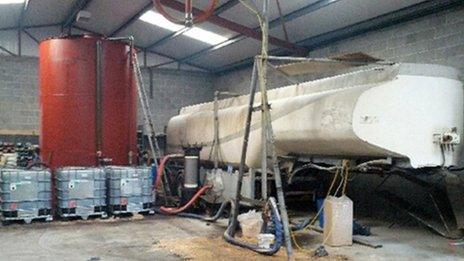Fuel laundering 'costs tens of millions' to governments
- Published

Fuel laundering remains a very profitable business
Fuel laundering and smuggling costs the governments on both sides of the border tens of millions annually.
In Northern Ireland, the latest estimates from HMRC suggest the UK government lost about £70m in revenue in 2012.
That is a lot of money, but considerably less than the estimates of about £250m back in 2006.
In the Republic of Ireland, according to figures reported by a Dail committee that investigated the issue, the authorities lose about 150m euro each year.
Those millions would otherwise be available to the governments to spend on public services, so it is a problem that has received considerable attention.
In recent years, both governments have increased co-operation to tackle the problem.
Last year's finance bill in the republic included special measures designed to give tax authorities greater power and oversight of the oil trade with new requirements for the recording and reporting of transactions by traders.
The budget also raised duty on diesel.
This has contributed - along with a weaker pound - to a narrowing of the price difference north and south, thereby reducing the profit incentive for smuggling.
However, fuel laundering - where the lower-taxed agricultural diesel is treated and sold for road use - remains a very profitable business.
One tanker load can account for £15,000 in lost revenue.
The problem is particularly acute in Northern Ireland compared to the rest of the UK.
Illicit sales in Northern Ireland currently account for an estimated 12% of sales - that's down from a high of 40% six years ago - but much higher than the average in Great Britain of 4-5%.
- Published13 March 2013
- Published31 January 2013
- Published30 January 2013
- Published18 January 2012